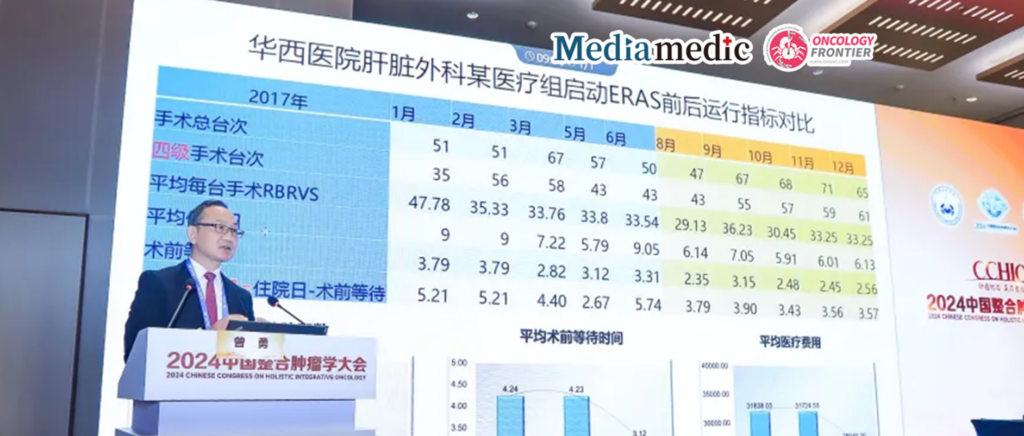
Editor's Note:Enhanced Recovery After Surgery (ERAS) represents a cornerstone concept in modern perioperative management. It employs a series of evidence-based interventions designed to mitigate or alleviate the body's stress responses, ultimately promoting rapid postoperative recovery. Nevertheless, many challenges and considerations remain in the implementation of ERAS.At the 2024 Chinese Congress of Holistic Integrative Oncology (CCHIO), Dr. Yong Zeng from West China Hospital Sichuan University presented a keynote lecture titled “Advances and Clinical Practice of Enhanced Recovery for Liver Surgery.” This presentation comprehensively detailed the valuable insights and experiences of West China Hospital in implementing and managing ERAS.
I. What Can ERAS Offer?
A meta-analysis published in Clinical Nutrition compared outcomes between patients undergoing major elective open colorectal surgeries under ERAS protocols and those receiving traditional perioperative care. This study included six trials with 452 patients. ERAS protocols ranged from 4–12 interventions, with an average of nine. Findings revealed that ERAS reduced hospital stays by an average of 2.55 days and decreased complication rates by up to 47%.
Similarly, a 2017 evaluation by a liver surgery team at West China Hospital demonstrated that adopting ERAS protocols significantly reduced hospital stays, preoperative waiting times, and medical costs.
Given the complexity, invasiveness, and high complication rates of hepatopancreatobiliary surgeries, modern principles of precision, minimally invasive techniques, and damage control have laid a strong foundation for ERAS. The 2015 Consensus on Enhanced Recovery After Surgery for Hepatopancreatobiliary Procedures further catalyzed the adoption of ERAS in liver surgery in China.
II. Key Components of ERAS in Perioperative Hepatectomy
ERAS focuses on reducing stress and trauma through measures such as optimized pain management, minimized incisions, targeted nutritional support, metabolic regulation, hypothermia prevention, and inflammation mitigation. ERAS principles span the entire patient journey, from pre-admission to discharge, emphasizing patient-centered care.
1. Preoperative Planning
- Patient Education: Comprehensive education is provided throughout the perioperative period. At West China Hospital, the goal of education is to improve patient and family understanding of ERAS principles, alleviate anxiety, and enhance cooperation. Modern information technologies are used to overcome spatial and temporal limitations, tailoring educational materials to different age groups, cultural backgrounds, and literacy levels.
- Updated Fasting Guidelines: Traditional fasting protocols (12 hours of fasting and 6 hours of no fluids) have been replaced with a 6-hour fasting and 2-hour clear-fluid allowance. This approach reduces insulin resistance, postoperative discomfort, and delayed recovery of digestive function.
- Nutritional Management: Nutrition plans are customized based on individual needs, with comprehensive assessments conducted from admission to postoperative recovery.
- Antibiotic Prophylaxis: Prophylactic antibiotics are recommended for Type II surgical incisions, while routine anxiolytics are generally not advised.
2. Intraoperative Management
- Temperature Control: Maintaining body temperature above 36°C during surgery is essential. Fluid warming devices are employed, and warming blankets are used for patients at risk of hypothermia.
- Selective Drainage Placement: Routine drainage in liver surgeries is avoided unless clinically indicated.
- Minimizing Surgical Trauma: Precision, minimally invasive techniques, and damage control principles are prioritized to reduce trauma and stress. Several incision types are evaluated for their impact on recovery, with efforts to minimize complications such as chronic pain.
3. Postoperative Interventions
- Early Drain Removal: Gastric and urinary catheters are typically removed within 1–2 days post-surgery.
- Early Enteral Nutrition: Liquid diets are introduced within hours of surgery, progressing gradually to solid foods. Laxatives like lactulose are commonly used to stimulate gastrointestinal motility.
- Goal-Directed Fluid Therapy (GDFT): Fluid management is individualized to ensure optimal circulatory volume while avoiding overhydration.
- Managing Nausea and Vomiting: Antiemetics such as metoclopramide or serotonin receptor antagonists are used prophylactically.
- Pain Management: Multimodal analgesia includes epidural anesthesia, patient-controlled analgesia pumps, and local anesthetic infiltration. Pain levels are monitored using VAS scoring to adjust treatments as needed.
- Early Mobilization: Structured early activity promotes recovery, prevents complications like pneumonia, and reduces the risk of deep vein thrombosis.
4. Discharge Management
ERAS emphasizes enhanced recovery rather than simply reducing hospital stays. Discharge criteria include pain control, normal body temperature, adequate nutrition, and stable organ function. Follow-up systems ensure long-term recovery and minimize readmissions.
Conclusion
ERAS reflects a patient-centered philosophy, aiming for minimal surgical stress and optimal recovery. Its principles—“zero pain and no risk”—represent the future of surgical care. As surgical techniques evolve, ERAS protocols must adapt, continually improving outcomes for patients undergoing liver surgery.

Yong Zeng, MD, FRCS
- Professor and Doctoral Supervisor, Department of Liver Surgery and Liver Transplantation Center, Sichuan University West China Hospital
- Former Deputy Medical Director, Sichuan University West China Hospital
- Vice Chair, Biliary Tumor Committee, Chinese Anti-Cancer Association
- Vice President, Translational Medicine Branch, Chinese Research Hospital Association
- Member, Hepatic Surgery Group, Chinese Medical Association
- Vice President, Sichuan Province Medical Association
- Chair, Surgery Specialty Committee, Sichuan Medical Association
- Honorary Chair, Hepatology Specialty Committee, Sichuan Medical Association
- Chief Health Expert, Sichuan Province
- Academic and Technical Leader, Sichuan Province
- Tianfu Distinguished Physician, Sichuan Province
- Fellow, Royal College of Surgeons (FRCS)


